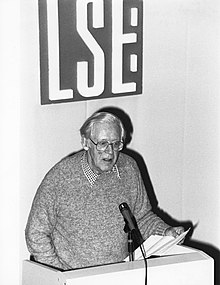|
Rodney Hilton
Rodney Howard Hilton FBA (17 November 1916 – 7 June 2002) was an English Marxist historian of the late medieval period and the transition from feudalism to capitalism. BiographyHilton was born in Middleton in Lancashire. He studied at Manchester Grammar School and arrived at Balliol College, Oxford in 1935. There he joined the student branch of the Communist Party. The influence of his tutors V. H. Galbraith and R. W. Southern drew him to medieval history. He acquired a first-class degree in modern history in 1938, was a Harmsworth Senior Scholar at Merton College, Oxford 1939-1940,[1] and took his DPhil in 1940, writing his dissertation on The Economic Development of Some Leicestershire Estates in the Fourteenth and Fifteenth Centuries. In 1939 he married fellow student and communist Margaret Palmer. Their only child, Tim, was born in 1941.[2] He entered the army in 1940, serving as a regimental officer 46th battalion of the Royal Tank Regiment. During World War II he was posted at first in Italy, then in Egypt, Palestine and Lebanon.[2] His communist allegiances had attracted the interest of British military intelligence and during his service, his superiors were tasked with monitoring and recording his movements.[3] Returning to England, in 1946 Hilton co-founded the Communist Party Historians Group and was appointed to a lectureship at the University of Birmingham, where he remained until his retirement in 1982. Together with other CPHG members and non-Marxist historians, he founded the journal Past and Present in 1952. He continued to be monitored by police and MI5, who recorded his phone calls and opened his mail.[3] Hilton was among many who resigned from the Communist Party in 1956 over the Soviet invasion of Hungary and became involved with the emerging British New Left. In 1963 he was made Professor of Medieval and Social History, and in 1973 joined the editorial board of the newly formed Journal of Peasant Studies.[4] Hilton married his second wife Gwyneth Joan Evans in 1951, and together they had two children, Owen and Ceinwen. However their marriage did not last and in 1971 he married fellow historian Jean Birrell, who would survive him.[2] His students included Peter Coss and Christopher Dyer. His papers are held at the University of Birmingham Special Collections. WorksHis works include:
References
External links
|
||||||||||
